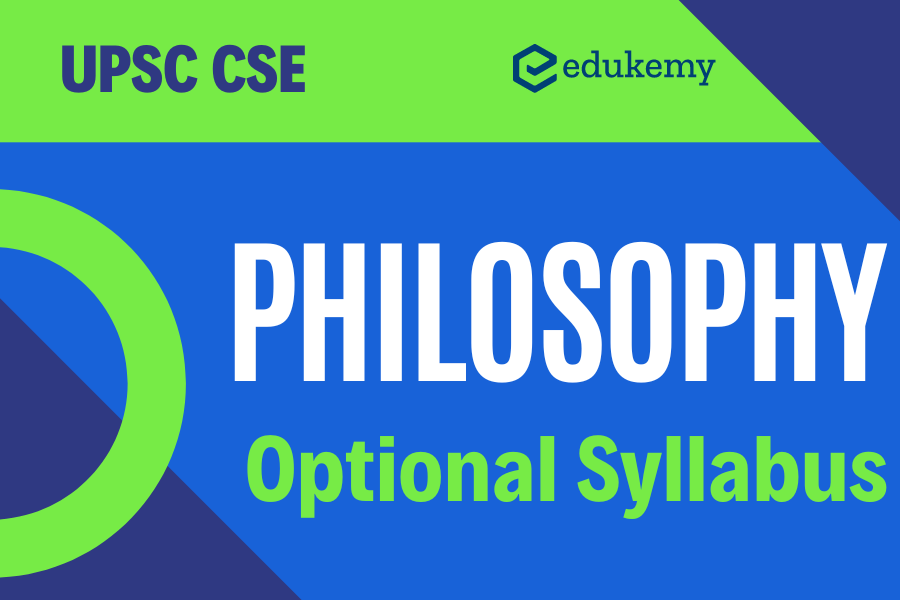
The UPSC includes Philosophy as one of the optional subjects among the 48 subjects available for candidates to choose from. The syllabus for Philosophy in the UPSC exam is highly specialized and encompasses a diverse range of topics, including Indian philosophy, Western philosophy, ethics, epistemology, and metaphysics.
Candidates who choose Philosophy as their optional subject will have to appear for two papers, with each paper carrying 250 marks, resulting in a total of 500 marks for this subject. These optional papers are an integral part of the UPSC Mains Examination, which comes after the IAS Preliminary exam. While Philosophy may not be as commonly chosen as some other subjects for the IAS Mains exam, individuals with a graduation degree or a strong background in Philosophy have the opportunity to select it as their preferred optional subject.
Contents
- 1 Philosophy Optional Syllabus: Paper-1
- 2 Philosophy Optional Syllabus: Paper-2
- 3 Frequently Asked Questions (FAQs)
Philosophy Optional Syllabus: Paper-1
History and Problems of Philosophy:
- Plato and Aristotle: Ideas; Substance; Form and Matter; Causation; Actuality and Potentiality.
- Rationalism (Descartes, Spinoza, Leibniz): Cartesian Method and Certain Knowledge; Substance; God; Mind-Body Dualism; Determinism and Freedom.
- Empiricism (Locke, Berkeley, Hume): Theory of Knowledge; Substance and Qualities; Self and God; Scepticism.
- Kant: Possibility of Synthetic a priori Judgments; Space and Time; Categories; Ideas of Reason; Antinomies; Critique of Proofs for the Existence of God
- Hegel: Dialectical Method; Absolute Idealism
- Moore, Russell and Early Wittgenstein: Defence of Commonsense; Refutation of Idealism; Logical Atomism; Logical Constructions; Incomplete Symbols; Picture Theory of Meaning; Saying and Showing.
- Logical Positivism: Verification Theory of Meaning; Rejection of Metaphysics; Linguistic Theory of Necessary Propositions.
- Later Wittgenstein: Meaning and Use; Language-games; Critique of Private Language.
- Phenomenology (Husserl): Method; Theory of Essences; Avoidance of Psychologism.
- Existentialism (Kierkegaard, Sartre, Heidegger): Existence and Essence; Choice, Responsibility, and Authentic Existence; Being–in–the–world and Temporality.
- Quine and Strawson: Critique of Empiricism; Theory of Basic Particulars and Persons.
- Carvaka: Theory of Knowledge; Rejection of Transcendent Entities.
- Jainism: Theory of Reality; Saptabhanginaya; Bondage and Liberation.
- Schools of Buddhism: Prat Ityasamutpada; Ksanikavada, Nairatmyavada.
- Nyaya- Vaiesesika: Theory of Categories; Theory of Appearance; Theory of Pramana; Self, Liberation; God; Proofs for the Existence of God; Theory of Causation; Atomistic Theory of Creation.
- Samkhya: Prakrti; Purusa; Causation; Liberation
- Yoga: Citta; Cittavrtti; Klesas; Samadhi; Kaivalya.
- MimÄmsÄ: Theory of Knowledge
- Schools of Vedanta: Brahman; Isvara; Atman; Jiva; Jagat; Maya; Avida; Adhyasa; Moksa; Aprthaksiddhi; Pancavidhabheda.
- Aurobindo: Evolution, Involution; Integral Yoga.

Philosophy Optional Syllabus: Paper-2
Socio-Political Philosophy
- Social and Political Ideals: Equality, Justice, Liberty.
- Sovereignty: Austin, Bodin, Laski, Kautilya.
- Individual and State: Rights; Duties and Accountability
- Forms of Government: Monarchy; Theocracy and Democracy.
- Political Ideologies: Anarchism; Marxism and Socialism
- Humanism; Secularism; Multiculturalism.
- Crime and Punishment: Corruption, Mass Violence, Genocide, Capital Punishment.
- Development and Social Progress.
- Gender Discrimination: Female Foeticide, Land and Property Rights; Empowerment.
- Caste Discrimination: Gandhi and Ambedkar
Philosophy of Religion:
- Notions of God: Attributes; Relation to Man and the World. (Indian and Western).
- Proofs for the Existence of God and their Critique (Indian and Western).
- Problem of Evil.
- Soul: Immortality; Rebirth and Liberation.
- Reason, Revelation, and Faith.
- Religious Experience: Nature and Object (Indian and Western).
- Religion without God.
- Religion and Morality.
- Religious Pluralism and the Problem of Absolute Truth.
- Nature of Religious Language: Analogical and Symbolic; Cognitivist and Non-cognitive.
Frequently Asked Questions (FAQs)
Q: What are the key branches of philosophy covered in the optional syllabus?
A: The philosophy optional syllabus typically encompasses major branches such as Metaphysics, Epistemology, Ethics, Logic, and Political Philosophy. It may also include specific topics like Indian Philosophy, Western Philosophy, and Contemporary Philosophy, providing a comprehensive overview of philosophical thought.
Q: How does the philosophy optional syllabus contribute to a broader understanding of other disciplines?
A: Studying philosophy as an optional subject enhances critical thinking, analytical skills, and the ability to articulate ideas effectively. Philosophical concepts often intersect with various disciplines like science, psychology, sociology, and literature, fostering a holistic understanding of the interconnectedness of knowledge.
Q: Is familiarity with historical philosophical texts necessary for the philosophy optional syllabus?
A: Yes, the syllabus often involves the study of classical and historical philosophical texts. These texts serve as foundational works, providing insights into the development of philosophical ideas over time. Familiarity with key texts is crucial for a comprehensive understanding of philosophical thought and its evolution.
In case you still have your doubts, contact us on 9811333901.
For UPSC Prelims Resources, Click here
For Daily Updates and Study Material:
Join our Telegram Channel – Edukemy for IAS
- 1. Learn through Videos – here
- 2. Be Exam Ready by Practicing Daily MCQs – here
- 3. Daily Newsletter – Get all your Current Affairs Covered – here
- 4. Mains Answer Writing Practice – here
Visit our YouTube Channel – here

